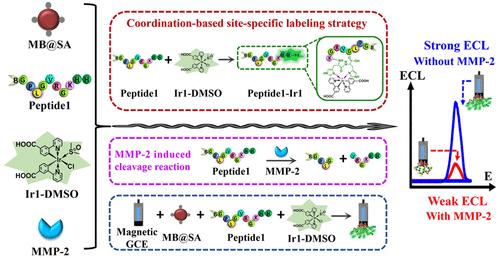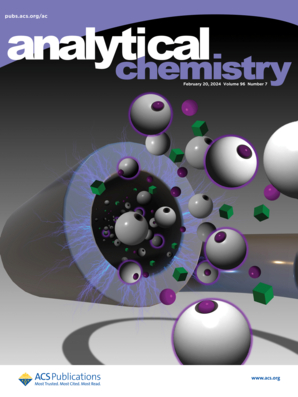Coordination-Based Site-Specific Labeling Strategy for Electrogenerated Chemiluminescence Biosensing of Matrix Metalloproteinase 2
IF 6.7
1区 化学
Q1 CHEMISTRY, ANALYTICAL
引用次数: 0
Abstract
Matrix metalloproteinase 2 (MMP-2) is an important biomarker for some diseases. Herein, one first-case coordination-based site-specific labeling strategy is proposed for electrogenerated chemiluminescence (ECL) biosensing of MMP-2 by employing an iridium(III) solvent complex as a signal reagent and a histidine (His)-containing peptide as a molecular recognition substrate. One ECL probe was prepared via coordination labeling of the His-containing peptide with one iridium(III) solvent complex ([(3-(2-pyridyl)benzoic acid)2Ir(DMSO)Cl], Ir1-DMSO). High ECL efficiency and good cleavage ability by MMP-2 were obtained for the ECL probe. By combining the high sensitivity of the ECL method, the good specificity of the peptide, and the simpleness of the magnetic bead-based assay, one “cleavage-magnetic enrichment type” ECL biosensing method was developed to detect MMP-2. MMP-2 can be sensitively detected in the linear range of 1.0–10 ng/mL with a limit of quantification of 1.0 ng/mL and a limit of detection of 0.3 ng/mL. Moreover, the ECL biosensing method was successfully applied for the determination of MMP-2 in serum samples with recoveries from 98.0% ± 8.0% to 108.0% ± 6.0%. Further, high affinity (Kd = 0.11 nM) was obtained for the Ir1-DMSO-labeled His-containing peptide and MMP-2. This work may pave the way for the labeling of His-containing biomolecules with an iridium(III) solvent complex and provides a promising method in point-of-care testing of MMP-2.

用于基质金属蛋白酶 2 的电致化学发光生物传感的基于配位的位点特异性标记策略
基质金属蛋白酶 2(MMP-2)是某些疾病的重要生物标记物。本文首次提出了一种基于配位的位点特异性标记策略,即以铱(III)溶剂复合物为信号试剂,以含组氨酸(His)的多肽为分子识别底物,对 MMP-2 进行电致化学发光(ECL)生物传感。通过含组氨酸(His)多肽与一种铱(III)溶剂配合物([(3-(2-吡啶基)苯甲酸)2Ir(DMSO)Cl],Ir1-DMSO)配位标记,制备了一种 ECL 探针。该 ECL 探针具有较高的 ECL 效率和良好的 MMP-2 裂解能力。结合 ECL 法的高灵敏度、多肽的良好特异性和磁珠法的简便性,一种 "裂解-磁性富集型 "ECL 生物传感方法被开发出来用于检测 MMP-2。MMP-2 的线性范围为 1.0-10 ng/mL,定量限为 1.0 ng/mL,检测限为 0.3 ng/mL。此外,该 ECL 生物传感方法还成功地用于测定血清样品中的 MMP-2,回收率为 98.0% ± 8.0% 至 108.0% ± 6.0%。此外,Ir1-DMSO 标记的含 His 肽与 MMP-2 的亲和力很高(Kd = 0.11 nM)。这项研究为用铱(III)溶剂复合物标记含 His 的生物大分子铺平了道路,并为 MMP-2 的定点检测提供了一种可行的方法。
本文章由计算机程序翻译,如有差异,请以英文原文为准。
求助全文
约1分钟内获得全文
求助全文
来源期刊

Analytical Chemistry
化学-分析化学
CiteScore
12.10
自引率
12.20%
发文量
1949
审稿时长
1.4 months
期刊介绍:
Analytical Chemistry, a peer-reviewed research journal, focuses on disseminating new and original knowledge across all branches of analytical chemistry. Fundamental articles may explore general principles of chemical measurement science and need not directly address existing or potential analytical methodology. They can be entirely theoretical or report experimental results. Contributions may cover various phases of analytical operations, including sampling, bioanalysis, electrochemistry, mass spectrometry, microscale and nanoscale systems, environmental analysis, separations, spectroscopy, chemical reactions and selectivity, instrumentation, imaging, surface analysis, and data processing. Papers discussing known analytical methods should present a significant, original application of the method, a notable improvement, or results on an important analyte.
 求助内容:
求助内容: 应助结果提醒方式:
应助结果提醒方式:


